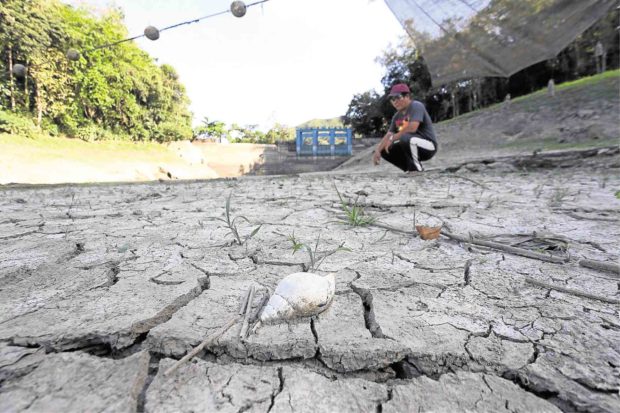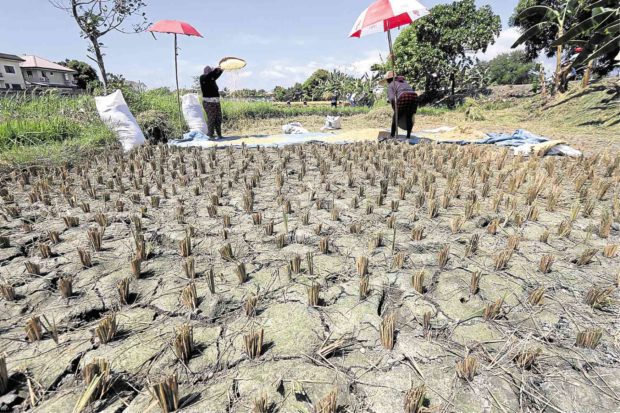El Niño: Cebu allots P20M to aid farmers

DRASTIC DROP The combination of extreme heat and lack of heavy rainfall in the past two months has led to a drastic drop in the water level at Buhisan Dam, which supplies at least 6,000 households and establishments in Cebu City and nearby areas. —JUNJIE MENDOZA
CEBU CITY — The provincial government of Cebu will set aside P20 million from its calamity fund to assist towns and cities severely hit by the dry spell, the Provincial Disaster Risk Reduction and Management Office (PDRRMO) said.
On Monday, the provincial board placed Cebu under a state of calamity as the drought destroyed P100 million worth of agricultural and fishery products.
The declaration, contained in a resolution approved by the provincial board on Monday, stemmed from the recommendation of the PDRRMO, which conducted an initial survey on the state of water sources, crops and livestock in the province.
Vulnerable
“The El Niño phenomenon is on its initial stage. Further damage on agricultural crops, livestock, fishery and water supply will be prevented if appropriate interventions and assistance are immediately provided to these vulnerable sectors,” the resolution read.
Board Member Jovito Ouano, who authored the resolution, said the declaration was necessary to “provide assistance to affected sectors [and] minimize the adverse effects of El Niño.”
The PDRRMO, in a report, said the dry spell was just starting yet the damage on agriculture and fishery sectors had reached P100 million.
The Philippine Atmospheric, Geophysical and Astronomical Services Administration station on Mactan Island observed an 80-percent drop in average rainfall in Cebu in February and March.
Weather specialist Netherlen Saletrero said the dry spell was expected to worsen in April and May.
Corn farms hit
Baltazar Tribunalo Jr., PDRRMO chief, said P20 million from the P59-million calamity fund could be used to help farmers affected by El Niño.
He said 27 of 51 local governments in Cebu had declared agricultural losses from the drought. Corn farms, he said, lost P25 million.

EARLY HARVEST Farmers in Barangay Mohon, Talisay City, are forced to harvest their palay early to cut losses from the drought that has been ravaging farms in Cebu province. JUNJIE MENDOZA
Worst hit by the drought were the cities of Mandaue, Danao, Carcar and Toledo and the towns of Asturias, Alcantara, Aloguinsan, Alcoy, Argao, Balamban, Dumanjug, Sogod, Dalaguete, San Remigio, Sibonga, Tuburan, Tabuelan, Daanbantayan, Medellin, Bantayan, Carmen, Madridejos, Santa Fe, Consolacion, Compostela, Boljoon and Minglanilla.
Water supply
The dry spell had also affected one of the two major dams maintained by the Metropolitan Cebu Water District (MCWD), which services more than 183,000 households and establishments in the cities of Cebu, Mandaue, Talisay and Lapu-Lapu as well as the towns of Consolacion, Liloan, Compostela and Cordova.
The MCWD said its Buhisan Dam, located in an upland village in Cebu City, had “zero production” starting this week. The dam used to supply 6,000 cubic meters daily to at least 6,000 households.
Water production in the MCWD Jaclupan Dam in Talisay City also dropped to 19,000 cu. m from 33,000 cu. m due to the absence of rainfall, said MCWD spokesperson Charmaine Rodriguez-Kara.
The drop in water supply prompted the MCWD to schedule water interruptions in its franchise area.